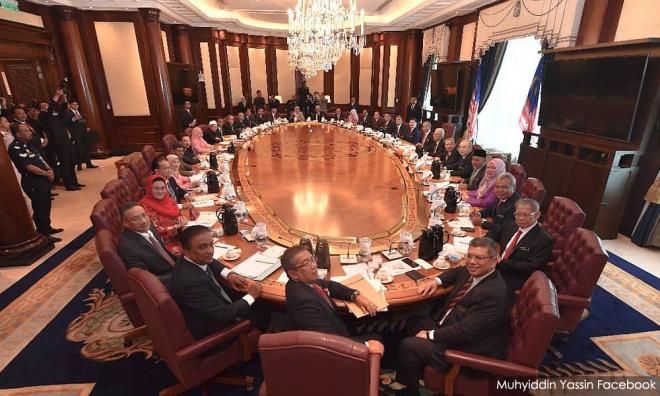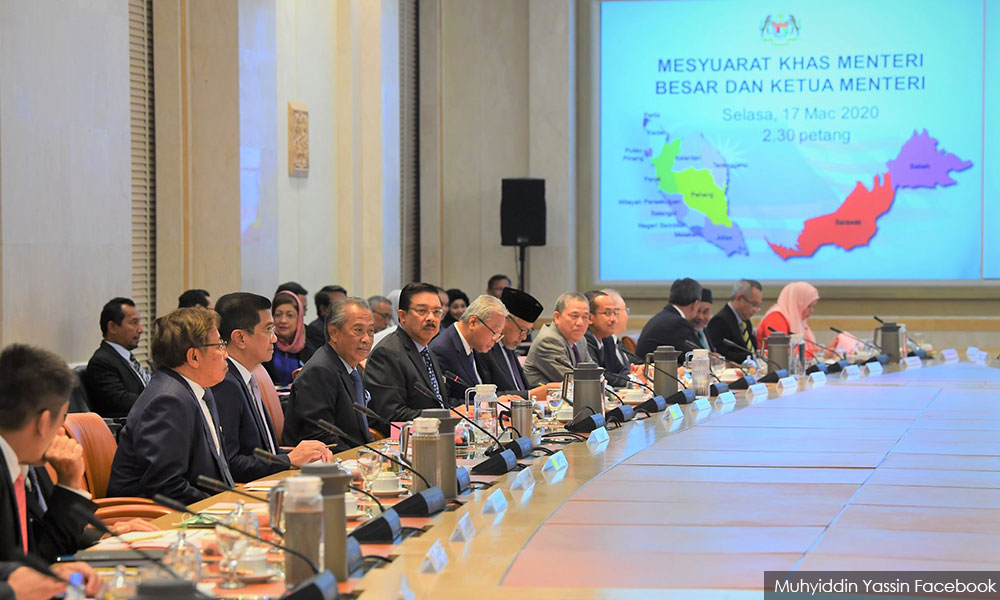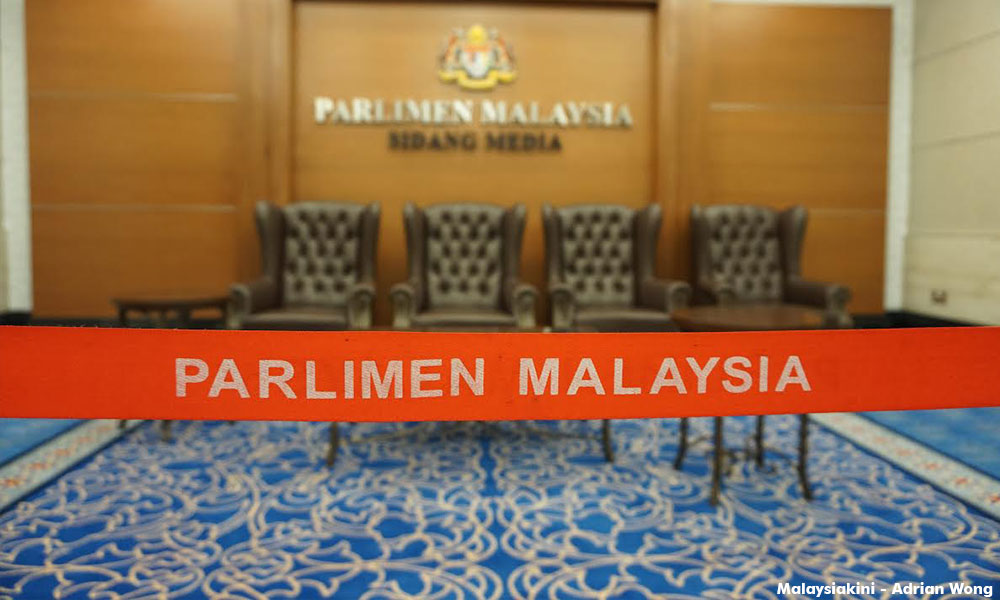
The restricted movement order is necessary, the one-day grace period should have been useful but the chaos on Tuesday and some on-going confusion suggest poor planning and coordination between ministries and agencies.
The long queues in police stations and the double U-turns on permission needed for interstate travel, the shutting down of university hostels which forced students to return home, the lack of protection for low-income workers, no arrangement on childcare for frontliners and the lack of bilateral coordination for Malaysians working in Singapore, all of these raise questions on the competence – not just legitimacy – of the Muhyiddin government.
Why can’t the Home Minister Hamzah Bin Zainuddin, Higher Education Minister Noraini Binti Ahmad, Transport Minister Wee Ka Siong, Human Resource Minister Saravanan Murugan, Women and Family Minister Rina Binti Mohd Harun and Foreign Minister Hishammuddin Hussein plan and coordinate better? Did they raise the issues with the National Security Council, of which Hamzah is a member? These are legitimate questions that they owed answers to all Malaysians.
However, if you attribute the incompetence of these ministers only to the “backdoor” and motley nature of Muhyiddin’s administration and miss the Pakatan Harapan government, do remember just a month ago, many Malaysians also complained about Harapan's incompetent ministers.
Hence, the Muhyiddin administration’s mishandling of the Covid-19 outbreak is not novel but merely highlights how costly the flaws in our political system can be.

So, how can we have more competent ministers or simply a technocratic government that many Malaysians would dream of? What are the possible solutions?
Solution 1: A non-partisan cabinet
Many Malaysians subconsciously see politics as a 3D – dirty, dangerous and difficult – job (or a job best left to foreign workers) and want to keep politics out of their mind as far as they can.
The intuitive solution is then to let people pick a great guy as the head of government, who can then freely pick his/her teammates disregarding partisan considerations and hierarchy.
Yes, that’s why Mahathir’s desire of having a government unconstrained by parties was supported by some pundits and bizarrely, even by democracy activists.
Can a government be "partyless" yet still be democratic?
Theoretically, yes. If the head of government is chosen by the entire electorate, then the person can cherrypick talent from any party, subject to the approval of the legislature.
In other words, it has to be a presidential system like the US or a semi-presidential system like France.

For example, President Emmanuel Macron (photo), who rose to the top on the ruin of France’s two major parties, appointed a gender-parity, technocratic cabinet covering much of the left-right spectrum.
Allowing a man whom only 42,697 voters in Langkawi choose to prevail over the collective choice of 15 million voters nationwide is not democratic. It is creating a virtual president but without the democratic mandate.
Hence, a non-partisan cabinet is a non-option forcing Malaysia to choose between democracy and constitutional monarchy.
Beyond the legal ban on republicanism, there are legitimate arguments, theoretical and empirical against presidentialism.
Solution 2: Parliamentary reform
The cabinet is not meant to be a supreme council of professional guilds, where the representatives of Bar Council, Medical Association, Institute of Engineers and teachers’ union run the ministries of Law, Health, Public Works and Education.
Instead, the cabinet needs generalist politicians with special focus, who both understand their portfolios and see the bigger picture.
How do we train such politicians? Beyond cherrypicking technocrats for electoral contests, there are only two systemic ways - learning on the job, and specialisation through parliamentary scrutiny.
If we have frequent turnovers of power so that incompetent ministers get kicked out regularly, market forces will produce enough professional politicians.
If such on-the-job training opportunities are available at all levels - federal, state and local - then we don’t have to worry about a supply of talents.
This is the primary reason why some Harapan ministers under-performed – unless they have served previously in the BN administrations, their training grounds were mainly limited to state governments in Selangor and Penang. Yes, please blame former prime minister Tun Razak’s permanent abolition of local elections in 1976.
But the bigger reason that explains ministerial incompetence from BN, Harapan to the new Perikatan Nasional (PN) is the dysfunction of our parliament.
In parliamentarianism, check and balance hinges on the interaction between three groups of politicians - government frontbenchers (ministers and deputy ministers), government backbenchers and the opposition.
When parliamentary committees consisting of government backbenchers and opposition parliamentarians rigorously scrutinise specific ministries, ministers are kept on their toes while their backbench and opposition colleagues also get their training as critics and quality controllers.
Before 2018, Dewan Rakyat had only five general committees, covering Public Account (PAC), Selection, Standing Order, House and Privileges.

The Harapan government set up 10 special select committees including six on ministerial portfolios, namely defence and home affairs; gender equality and family development; states and federal affairs; human rights and constitutional affairs; international relations and trade; science, innovation and environment.
The new committees are in the infant stage and some may not even have their first meeting. Without a division of labour, how do we expect inexperienced MPs to be competent ministers?
So, don’t blame politics for ministerial incompetence. Blame the second till the sixth PMs who made the parliament dysfunctional.
Also, pressure the eighth PM to not disrupt the parliamentary reform under the current speaker Mohamad Ariff.
Solution 3: Job redesign for MPs
To have more ministerial materials, we need more MPs who see beyond their constituencies.
A Westminster myth which can be traced back to Edmund Burke (a one-term MP in 18th Century England) has us believe that MPs can put national interest above constituency interest.
In reality, single-member constituencies make MPs chasing “personal votes” because voters are choosing between candidates and not just parties.
In Malaysia, where most parties are not differentiated on policy and programmes, the popularity race is often reduced to two things -constituency service and development funding.
In some contexts, constituency service may even mean KBSM. Not Kurikulum Bersepadu Sekolah Menengah (integrated curriculum of secondary schools) but four things elected representatives must attend to or they risk alienating voters, namely kahwin (wedding), bersalin (new birth), sakit (sickness) and mati (funeral).
The BN’s policy to discriminate against opposition lawmakers in constituency allocation continued under Harapan albeit to a slightly lesser extent. This is conveniently used to justify party hopping, both to and from Harapan.
If we want lawmakers to make laws and advocate policy options, we need to redesign their job.
Instead of candidates, parties should be given direct mandates so that they become the product and have to differentiate themselves on policies and issues.
Only then, parties will nominate more issue champions and technocrats rather than populists who hug babies or distribute money.
This requires larger, multi-member constituencies with a party-list proportional representation (List-PR) system where seats are allocated to parties based on their vote share.
We don’t have to entirely abandon the first-past-the-post (FPTP) system.
List-PR seats can be added on top of FPTP seats, like how it is done in Germany and New Zealand or in a simpler variant in Italy, Japan, Korea and Taiwan.
It’s not just PN, it’s the system
It would be tempting to blame everything on PN.
A symptom rather than the cause, PN just demonstrates how bad ministerial incompetence can be when a motley government worries about its own viability more than a virus pandemic.
The mess we endure today is collective karma. The flawed system does not prepare government backbenchers and opposition parliamentarians to be ministers. We didn’t see its flaws because we never had regime change and now we have it twice since 2018.
A presidential-style autocracy or bringing in some technocrats through the senate’s back door is no solution. The solution has to be a functioning parliament and a robust electoral system that forces parties to compete in governance than enticing crossovers. - Mkini



No comments:
Post a Comment
Note: Only a member of this blog may post a comment.